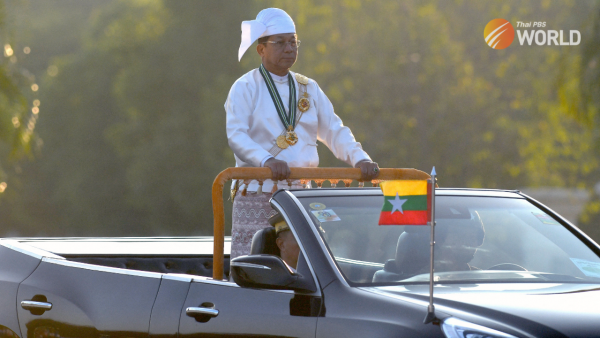When the current military government took over, one of the very first aims of leader Min Aung Hlaing was to make Myanmar adopt Electric Vehicles (EV).
He has been reported to have given several speeches at events about EVs and even about trains at meetings with his aides.
On November 22nd, 2022, the finance and planning ministry in Myanmar announced that the import of EVs will be tax-free.
The news was met with immediate criticism and cynicism as, on top of being an extremely unpopular government, Myanmar still struggles with keeping the lights on 24/7, even in major cities such as Yangon and Mandalay.
Nevertheless, Myanmar had gone ahead with the push to import Battery Electric Vehicle (BEV or EV for short) with zero taxation through both Completely Built Up (CBU) and Completely Knocked Down (CKD) systems.
The decision also extends to electronic devices, components and spare parts for EVs, if such parts are approved by the government.
“As of now, the committee is planning to issue more directives and regulations regarding the imports. The ministry is working on a submission to the Myanmar Investment Commission regarding that promoted sector for EVs,” said the finance and planning ministry.
A task force committee had also reportedly been formed, with General Mya Tun Oo at the helm, to facilitate the growth of the EV industry as well as the adoption of such vehicles.
According to the General, 26 companies applied for the EV import permit, but they are yet to receive an official green light.
As a pilot project, those looking to import EVs must be legally registered with all relevant government departments, provide documentary proof of the agreement with the brand of the EV that will be imported and follow the standard and the amount of EVs specified by the committee. The first wave will be a total of 40 EVs, of which at least 30 will be for rental e.g. for taxi services.
The importers must also provide necessary insurance, in terms of being able to provide spare parts and other services such as maintenance. They must also deposit 50 million MMK at one of the many Central Bank approved banks in Myanmar.
All vehicles must also be registered with the Road Transportation Administration Department.
A Low-Power nation
Myanmar is currently uses an alternating current (AC) electricity distribution system. In Yangon, the daily schedule switches between groups A and B. For example, if Group A has no access to electricity from 9am to 1pm, Group B will have their power cut from 1pm until 5pm. At the very least, there are 4 hours of planned blackouts daily across Yangon, as well as many other hours of unplanned blackouts.
The Yangon Electricity Supply Corporation (YESC) announced in December 2022, however, that it will soon follow a schedule of 9am to 4pm of lower wattage power, resuming full wattage power from then onwards until the next morning at 9am. Industrial zones will only receive electricity from 9am until 5pm.
Myanmar regularly faces electricity outages, from those that were planned by the YESC and those that aren’t planned. For example, natural gas pipelines fuelling power stations tend to leak, power generators at power stations tend to break down and power cable pylons in the national grid get damaged.
YESC had also announced that the Yadanar off-shore natural gas pipeline is sending a lower amount of natural gas to the stations, due to pipeline leaks, and lost around 433MW of power production.
Myanmar also relies heavily on hydroelectric power and is seeing lower amount of electricity generation in the summer, with a much higher frequency of power blackouts across the whole nation.
Union Minister Thaung Han of the Ministry of Electric Power said that more scheduling will be needed because Myanmar cannot provide sufficient power for the whole nation for the upcoming summer season.
How much will an EV cost?
According to the car market, pre-orders have gone up for some EVs.
Many in the industry also said that the EVs coming into the Myanmar market will be priced at 60 million MMK at the minimum. The cheapest options, for now, will be 67.9 million MMK for the “taxi” EV and around 70 million MMK for every-day use vehicles. The every-day use, “for home use” vehicles will, however, have to pay a certain amount of tax.
Industry experts say that prices are indeed attractive, compared to similar quality Internal Combustion Engine (ICE) vehicles. Prices of EVs are a lot cheaper due to the lack of tax. Electricity supply, however, remains a huge hurdle.
“There are still a lot of challenges in the market, with the main issue being that there’s no access to regular electricity here. We still don’t know how many charging/power stations they’re going to install or where they are going to put them. The other thing is the warranty and access to spare parts. All the EVs coming in are from Chinese companies and the quality of the vehicles is a factor that many are worried about,” said a car showroom owner.
A lot of the would-be buyers are also rather uneducated regarding EVs, says the owner.
“A car needs between 4 hours and 8 hours to charge and, even though you’d be saving money by not using petrol, the cost of batteries is high. A Nissan Leaf’s battery needs to be changed every 5 years and the battery costs around 18 million MMK. So, if you do the math, it’s not much of a difference and, of course, there are obvious weaknesses regarding the lack of basic infrastructure to support EVs.”
For now, the interest in the car market regarding EVs is rather high. Perhaps it may be a sign that the military government of Myanmar riding the global EV wave is a smart move and they may make good on their promises to support EVs in Myanmar.
Perhaps, it may just be yet another ambitious project doomed for failure. Only time will tell.

